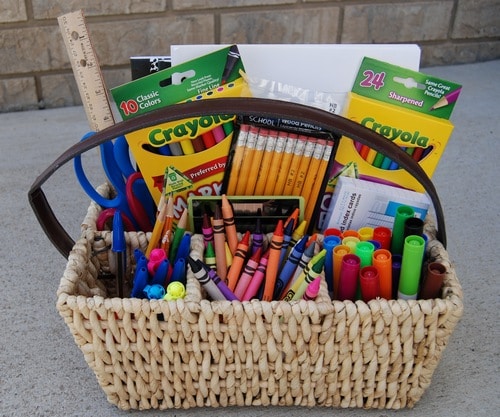One of the joys of motherhood: H.O.M.E.W.O.R.K. I used the letters of the dreaded word and came up with a few (okay eight) tips to help you through the daily grind:
H. Help, But Don’t Hover. Provide help, guidance and direction, but not answers. Ultimately it is your child’s homework not yours. And the goal of homework is not good grades; it is independent, life-long learning skills. The kids need to do the work and the learning. Encourage kids to ask questions when they are confused. And realize at some point, it might also become necessary to get outside help like a tutor or a learning center. Sometimes someone else helping our kids can be more effective.
O. Organize Materials. Gather basic homework materials before kids start homework and keep them in one spot. This eliminates having to get up and get that pair of scissors or the calculator. A desk for each child is ideal with all the supplies right there, but for many of us homework is the kitchen table. I have a portable homework caddy that holds all the supplies that I can put away when it is time to eat dinner. My caddy is just a utensil holder for now, but I am on the lookout for the perfect homework caddy.
If your students are on a A/B schedule you might want to consider 2 backpacks- one for each day. Color-coding folders and textbooks to classes also works well for jr. high and high school kids that are juggling different teachers and different subjects. The less they have to think about materials the more they can concentrate on the homework.
M. Minimize Distractions. This for sure means cell phones, but it also might mean music, TV, little brothers and sisters, hungry tummies, cold or hot rooms, poor lighting, etc. A cell phone is a distraction to anyone including me. Kids’ learning is fragmented if they are responding to every text as they try to study. And then in between texts they are waiting to hear the little beep that they got a text. The brain can’t possibly have a continuous thought. Confiscate the cell phone during homework time, and make it as calm and distraction free as possible.
E. Establish a Routine. As much as possible, have kids do homework at the same time and in the same place everyday. That time and place is different for every family. Do what works for you. Right after school works best for some kids and other kids need some time to play and relax and then they can refocus back in the evening. Early morning is even an option if kids go into school later. Avoid right before bed, as the brain is tired and you don’t want to short change sleep if the session goes longer than planned. Also, get into the routine of putting the homework right in the back pack as soon as it is completed.
W. Write It Down. Encourage your children to write down their homework assignments in a planner or notebook as soon as they get the assignment. Make sure you also write down important dates, projects and deadlines on the family calendar as well. Everyone has a better chance to remember something, if it is written down.
O. Observe and Offset Frustration. If your child seems to be frustrated a lot, observe and figure out the reason behind the frustration. Is your child struggling with math or is the reading of the story-problem really the hang up? Is your little guy having trouble thinking of a story or is it just that he doesn’t like to write the letters? Elle struggled big time with spelling homework. She refused to do it and we had more than one power struggle. After observing this frustration for a few weeks, we got to the bottom of it. I found out that she hated spelling because she really hated cutting out the words each week. She couldn’t get past the cutting task to study spelling. As soon as I talked to the teacher and got permission to practice with other methods, Elle was a lot happier. We wrote words with dry erase markers, played hangman, used magnetic letters, etc. It may be necessary to tweak the homework to offset the frustration. Read the story problems to your child or write the story for your son as he dictates it to you. As long as they learn what they are supposed to learn or demonstrate the specific skill they are supposed to demonstrate, you can think outside the box.
R. Respect and Reward. Respect the requirements and the teacher. Don’t sign a reading log if your kid didn’t read the 20 minutes. Don’t do their Science Fair project for them. Don’t say the homework is stupid or pointless or it doesn’t matter in front of your child. Never back-talk a child’s teacher or leader in front of them even if you have a valid point. This doesn’t mean you can’t disagree with the teacher or the homework– just go talk to the teacher about it. And reward your child now and again for great effort and work.
K. Keep Hydrated and Fueled. Did you know that water is a conductor of electricity and your brain is an electrical circuit? So your brain works faster and clearer when it has sufficient water. So make sure your kids have plenty of water as they do homework. And brains can focus when tummies aren’t hungry, so feed them high protein and high fiber snacks like string cheese, nuts, trail mix, fruits and veggies.
That’s all I got. Anyone else have any homework tips they can add?


![I spoke in church today and said the Atonement of Jesus Christ is the greatest act of Charity. I read Moroni 7:45-47 to make my point. But wherever there was the word ‘Charity’ I substituted it out for ‘the Atonement of Jesus Christ.’ See if these scripture verses now have new meaning for you:
“And the Atonement of Jesus Christ suffererth long, and is kind, and envieth not, and is not puffed up, seeketh not her own, is not easily provoked, thinketh no evil, and rejoiceth in the truth,
[The Atonement of Jesus Christ] beareth all things, believeth all things, hopeth all things, endureth all things.
Wherefore, my beloved brethren, if ye have not the Atonement of Jesus Christ, ye are nothing, for the Atonement of Jesus Christ never faileth. Wherefore, cleave unto the Atonement of Jesus Christ, which is the greatest of all, for all things must fail-
But the Atonement of Jesus Christ is the pure love of Christ, and it endureth forever; and whoso is found possessed of it at the last day, it shall be well with him.”
So Easter really reminds us of love. The first and greatest commandment.](https://www.raisinglemons.com/wp-content/plugins/instagram-feed-pro/img/placeholder.png)
Not sure if you noticed, but O.R.K. Are missing. Thanks for the tips.
Will you please come and help Hannah with spelling? Our power struggles are killing us both! I’ll try the different techniques idea. I didn’t know 2nd grade would be so much harder!
I just had to back off Elle and she flunked a few tests. Then that woke her up. I don’t know a kid that doesn’t like a white board and marker. Magnetic letters are fun too and some cookie sheets are magnetic. Good luck.
Did you peek at my boys during homework time and decide some suggestions were needed? Thank you for the timely post.
I love the homework caddy idea–even just taking a minute to go get a pencil or crayons during homework time at our house can turn into lots of minutes because of getting sidetracked.
I’m a teacher and LOVE this! It’s everything I communicate to my families when talking about homework. You’ve done a great job of putting it into an easy-to-read format. Thank you!